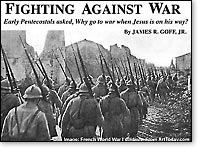
When World War I broke out, most adherents to the fledgling Pentecostal movement stood firmly on the side of pacifism. The movement's leaders, like Frank Bartleman and Charles Parham (who married a Quaker) had made it a key tenet years before, even though they believed war was inevitable.
The position drew strength from at least two quarters. First, Pentecostals took literally the biblical injunctions to "Love your enemies" and "Thou shalt not kill."
But Pentecostals also believed their movement heralded the end of the world as they knew it. As ardent premillennialists, they envisioned a final earth-shaking revival even as the world hastened down the final path of destruction that would lead to the coming Millennium.
From this perspective, the outbreak of war in 1914 offered tangible proof that the end was near and fighting against militant forces in Europe was useless. The only important battle was the warfare for souls.
Most Pentecostal denominations, therefore, took stands against the war and urged members to seek conscientious objector or noncombatant status. Some, like the Assemblies of God and the Pentecostal Holiness Church, declared their opposition to warfare but left the decision ultimately in the hands of their members.
The Church of God (Cleveland, Tenn.), though, passed a resolution specifically forbidding its members from participating in war. Its publication, the Church of God Evangel, actually faced a Justice Department investigation for possible violation of the Espionage and Sedition Acts.
In a similar vein, Charles H. Mason, head of the predominately black Church of God in Christ, was jailed in Mississippi for his vocal opposition to the war effort. Even more ardent was the opposition of a fiery prophet on the West Coast. Thomas Gourley, the white Pentecostal leader of a small commune on Lopez Island in the Puget Sound, stood trial in early 1919 on charges that he violated the Sedition Act of 1918 when he openly urged audiences to refuse Liberty bonds and stamps.
Defendants like Gourley were acquitted or at least saw their cases dropped as the end of the war reduced anxiety over pacifism. But by then it didn't matter as much. Pentecostals were already assuming a cultural position more akin to that of evangelicals. They built successful organizations and, as they did, mirrored more closely the fabric of American life. By the outbreak of the Second World War, Pentecostal denominations not only offered support for the morality of the American effort but also participated fully in the supply of military chaplains. And by Vietnam, many Pentecostals were staunchly antipacifist.
James R. Goff, Jr., is professor of history at Appalachian State University in Boone, North Carolina.
Copyright © 1998 by the author or Christianity Today/Christian History magazine. Click here for reprint information on Christian History.









